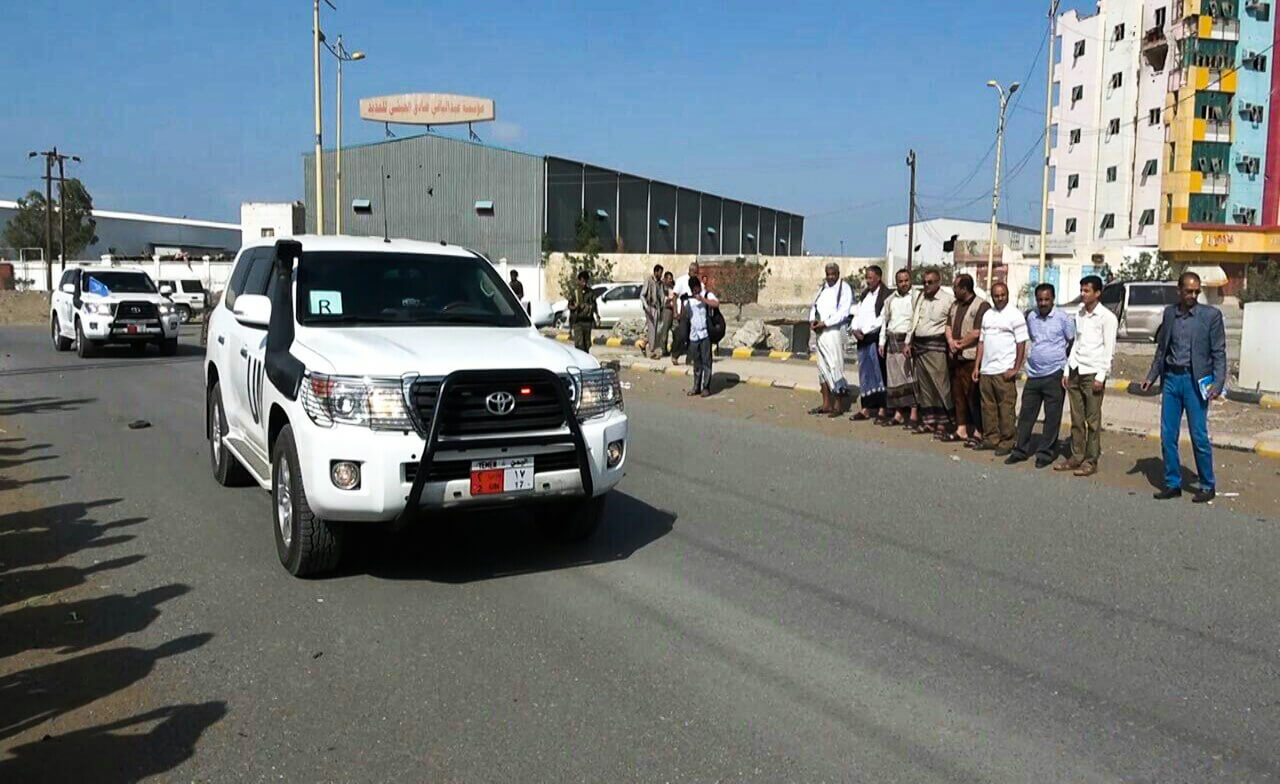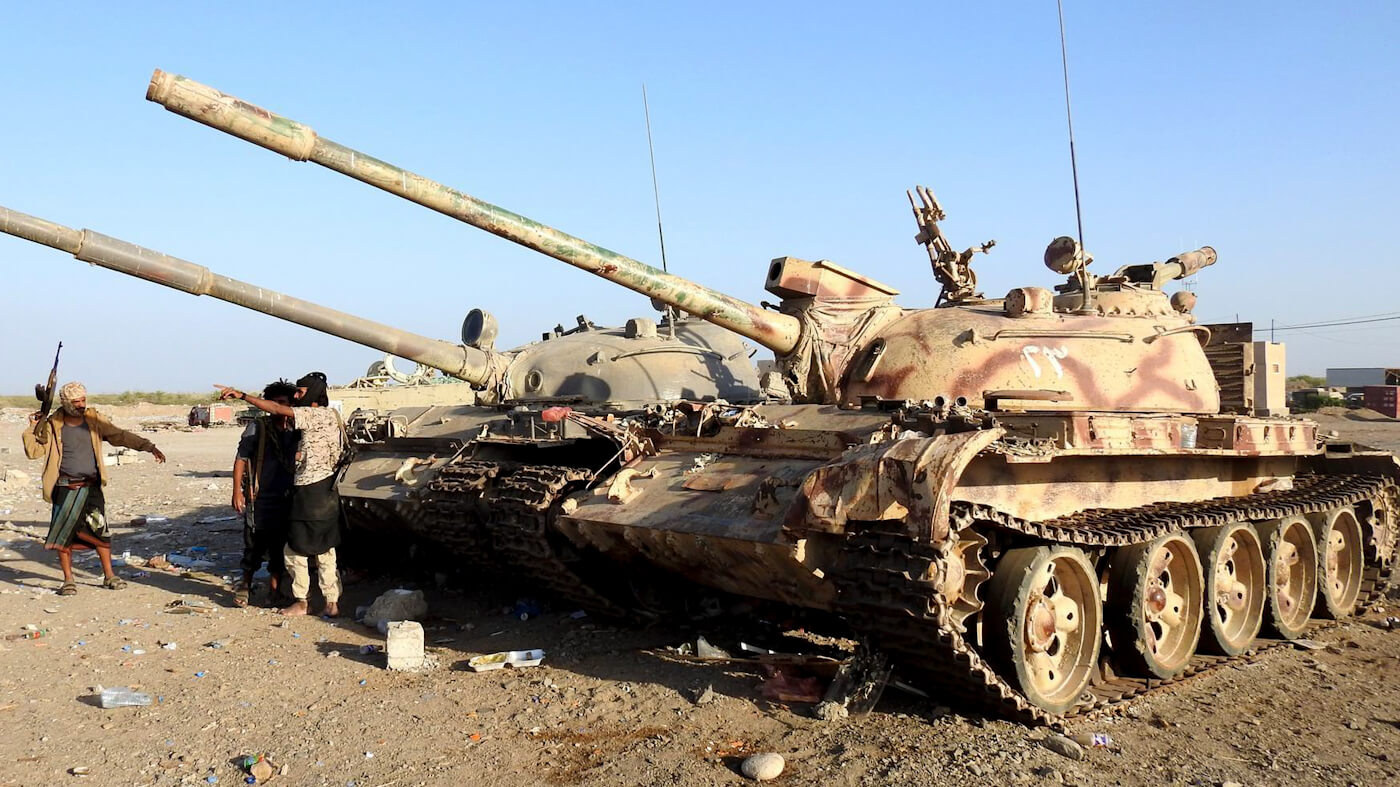HODEIDA, YEMEN — Hundreds of residents from across Yemen’s Red Sea port city of Hodeida took to the streets for the third straight day, calling on the United Nations to take action to implement a troop withdrawal deal between the Houthis and the Saudi-led Coalition that was reached on February 19th. Residents waved Yemeni flags, Kalashnikovs, and banners emblazoned with slogans accusing Saudi Arabia and its coalition allies of undermining the agreement and prolonging the suffering of Yemeni children.
Last week, representatives from Yemen’s Houthis and the Coalition agreed to redeploy their militaries to areas outside of Hodeida under a UN-sponsored deal. However, “Phase 1” of the withdrawal plan has yet to progress, as the implementation of the troop withdrawal has yet to take effect. The Houthis accuse the United Arab Emirates (UAE) of obstructing the implementation of the agreement, as indications arise that a return to violence in the flashpoint port city is imminent.
Under “Phase 1” of the withdrawal plan, the Houthis agreed to withdraw from the ports of Hodeida, Saleef and Ras Isa. Coalition forces would retreat from the eastern outskirts of Hodeida and reopen the roads linking Hodeida to Taiz and the Houthi-held capital, Sana’a.
A high-ranking Coalition official, who spoke on the condition of anonymity for fear of his safety, told MintPress News that Coalition leaders have not yet given permission for military commanders on the ground to start implementing the agreement. According to the Program of Meetings of the Coordination Committee, four requests have been submitted by Saudi officials in Riyadh to delay the deal’s implementation.
In a bid to breathe life into the deal, the Houthis as well as Hodeida’s resistance fighters unilaterally opened Hodeida’s 50th Street in order to allow a UN technical team to reach the Red Sea Mills, a food-storage facility that holds enough World Food Programme grain to feed 3.7 million people for up to one month.
On Monday, Abdul-Malik al-Houthi, leader of the Houthi political wing Ansar Allah, called on the army and resistance to facilitate the crossing of the UN team from 50th Street to the Red Sea Mills. The team left for the Mills from Houthi-controlled territory on Tuesday.

A unilateral offer by Yemen
The Houthis went on to say that they are ready to implement the UN-brokered agreement unilaterally in order to alleviate the suffering of Yemenis. Mohammed Ali al-Houthi, the head of Houthi Supreme Revolutionary Committee (SRC) said in a tweet:
The United Nations has been notified of the unilateral redeployment and to date, we have not received the start-up signal. The aggression [Saudi Arabia] and its allies are using is starvation as a weapon and rejecting peace.”
Houthi officials claim that the Saudi-led Coalition is evading the implementation of multiple UN-brokered deals, including a prisoners’ exchange deal and a deal to address the economy, as well as the Taiz calm plan. They also reiterated their commitment to the UN-brokered Stockholm truce:
We are ready to implement the stages of the Stockholm Agreement. We have taken unilaterally the first step in the port and the United Nations knows that.”
Hodeida’s Local Council issued a statement on Wednesday welcoming the Houthi gestures. The statement also accused the Saudi-led Coalition of ignoring the Stockholm Agreement and “seeking to bypass it and evade its implementation.” The Council’s statement added that “the Coalition has not proceeded on any part of the Swedish agreement on the ground, and it is not concerned about civilians in Hodeida.”
To better understand the impetus for the Houthi move to unilaterally implement parts of the deal, as well as their motivations behind it, MintPress spoke to Ansar Allah experts who said, “the Houthi waiver will likely be a successful tactic.” Majed al-Ghaili, an expert on the Houthis and Ansar Allah, said the Houthi initiative “should not be interpreted as weak,” adding:
It is a successful policy and has pulled the rug out from Saudi Arabia and cut off their pretexts. It shows that the Houthis are more eager for peace [than the Saudi-led Coalition]. Thus, they gain more local sympathy.”
Most local Hodeida residents still see the UN-brokered agreement as the best chance of ending the Saudi war against the province, a war that has pushed 14 million people to the brink of famine according to the United Nations.
According to local Hodeida residents protesting the deal, if the UAE persists with its behavior, no agreement will be able to achieve peace in the province; and, without pressure on UAE, the agreement will be relegated to no more than ink on a page.
Few indications of imminent peace
Indeed, there is little on the ground in Hodeida that indicates the Saudi-led Coalition intends to implement the UN-brokered agreement. Instead, anxious residents fear an imminent resumption of violent confrontations in the already war-torn city. Coalition fighters have built new fortifications and are conducting fresh drills at a nearby Air Defense Camp, at the city’s Western Airport, in the volatile Kilo-16 District, and in a multitude of schools and urban buildings dotting Hodeida. Further adding to the resident fears, a steady flow of Coalition military reinforcements have been rolling into the city.
There is also the ongoing buzz of Coalition drones over the skies of the province. On Tuesday, an unmanned aerial vehicle belonging to UAE was intercepted while it was on a reconnaissance mission over the Kilo-16 District.
Moreover, a salvo of mortar shells, Katyusha rockets, and the occasional airstrike have been lobbed on residential areas in Hodeida, killing and injuring dozens of civilians. On Friday a child was killed in the Al-Rameemeh district in southern Hodeida after his home was hit with a barrage of mortar shells.
Many local residents and analysts alike fear the Saudi-led Coalition is using the relative calm derived from the new agreement as cover to fulfill its military objectives and not as a stepping stone towards peace. On the ground, all indications are that the Coalition is still operating on the premise that capturing Hodeida would be an economic and military blow to the Houthis and would ultimately weaken the group.
Meanwhile, Yemen’s Armed Forces and allied fighters loyal to the Houthis say they are fully prepared to respond to any aggression by Saudi Arabia. Abdul-Malik al-Houthi warned the UAE against any military escalation in Hodeida, saying “I advise the UAE not to go back to the path of military escalation; if necessary we will take [whatever] options are necessary.” He declined to specify what those options were.
Yemen’s armed forces, loyal to the Houthis, have in recent years managed to develop strategic defensive weapons including ballistic missiles, drones, anti-ship missiles and naval mines, as well as an effective air-defense system, which they say may be revealed in coming days. They have also managed to effectively conceal large quantities of weapons in order to keep them safe from Coalition airstrikes.
For Yemen’s resistance, it may be hard to believe Western promises of bringing peace to Yemen after so many previous Middle-East agreements were made and subsequently broken. As a result, and with little confidence in an international appetite to stop the Saudi-led war on Yemen, the Houthi-allied military began development of a domestic ballistic missile program in the early days of the war.
The Coalition, led by Saudi Arabia and backed by the United States and other Western powers, has killed tens of thousands of Yemeni civilians since 2015 when the war began. Moreover, the Coalition’s blockade of food and medicine has plagued the country with an unprecedented famine and triggered a deadly outbreak of preventable disease that has cost thousands their lives.
The UN confirms the dimensions of the humanitarian disaster
Since peace talks began over a year ago, the lives of thousands of civilians in Yemen, especially in Hodeida, have worsened. The number of internally displaced people has increased to 3.3 million according to the United Nations. That figure marks a sharp uptick from the 2.2 million people recorded in previous years.
Despite the Stockholm agreement, 360,000 children are still suffering from severe acute malnutrition, fighting for their lives every day, according to UN Secretary-General Antonio Guterres, speaking to a donor conference in the Swiss city of Geneva on Tuesday. Guterres revealed that “one credible report put the number of children under five who have died of starvation at more than 80,000.”
Guterres went on to warn of the worsening health and humanitarian situation in Yemen, saying:
Over half of all health facilities are out of action, and nearly 20 million people lack access to adequate health care. Two million children in Yemen are out of school, and 2,000 schools have been directly affected by the conflict: damaged, destroyed, converted to shelter for the displaced or occupied by armed groups. And half of the teachers in Yemen have not been paid in over two years.”
The United Nations recently said that the number of people in the country who need humanitarian aid rose from 2 million to 24 million last year alone. It is in this context that the Yemeni people are losing hope for peace in their country.
Top Photo | Saudi mercenaries stand near tanks in the port city of Hodeida, Yemen. Jan 5, 2019. Photo | EPA
Ahmed AbdulKareem is a Yemeni journalist. He covers the war in Yemen for MintPress News as well as local Yemeni media.


